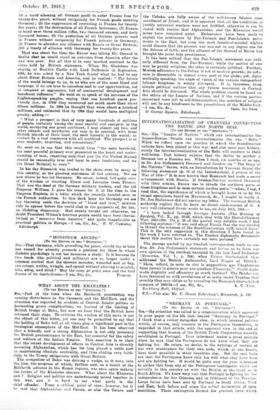WHAT ABOUT THE KHANATES ?
[To THE EDITOR or THE " SPECTATOR.") SIR,—Just at the time when the Bolshevik penetration was causing disturbance in the Caucasus and the Mid-East, and the situation was regarded by students of Central Asiatic politics as Portending grave complications, we learned of the landing of British troops at Baku, but now we bear that the British have retraced their steps. To criticize the wisdom of this move is not the object of this letter, yet one may be permitted to say that the holding of Baku will at all times play a significant part in the strategical atmosphere of the Mid-East. It has been observed that a friendly and a strong Afghanistan is not only necessary for British predominance in the East, but essential for the safety and welfare of the Indian Empire. This assertion is to show that the recent development of affairs in Central Asia is directly menacing Afghanistan, which has for long played a noble part in maintaining absolute neutrality, and thus abiding very faith- fully to the Treaty obligations with Great Britain.
The occupation of Baku was driving a wedge, as it were, into the line, the progress of which, further east, as a remit of the Bolshevik advance in the Kazan regions, was once again making the future of the Khanates obscure. What about the Khanates now ? Religion and politics are unfortunately mixed together in this war, and it is hard to say what party is the chief offender. From a critical point of view, however, let it he said that Afghanistan and Persia. as also the Tatars and
the Uzbeks, are fully aware of the well-known Islamic com- mandment of Jehad; and it is apparent that all the conditions to justify universal warfare were not fulfilled, otherwise it can be stated with justice that Afghanistan and the Khanates would never have remained quiet. Endeavours have been made to exploit the sentiments by Pan-Turanic and Pan-Islamic move- ments in the East, but even the most fanatical-minded Afghan could discern that the present war was not in any degree one for the defence of faith; and the alliance of the Shereef of Mecca has brought the point into prominence.
It has been noticed that the Pan-Islamic movement was radi- cally different from the Pan-Turanic; while the motive of one may be purely religious, the other is certainly political. Further, Moslem adherence to the Sultan is not of modern growth; its influ- ence is discernible in almost every part of the globe; yet, diplo- matically speaking, the angle of vision of the various independent Islamic kingdoms is widely divergent. It is, therefore, from simple political welfare that any future movement in Central Asia should be discussed. The whole problem should be based on the ethics of the League of Nations, and if the various parties concerned were left to self-determination, the question of religion will not be any hindrance to the peacefulness of the Middle-East.


































 Previous page
Previous page